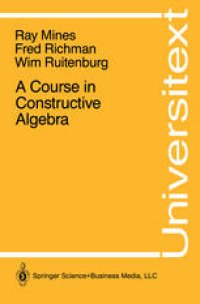
Ebook: A Course in Constructive Algebra
- Tags: Algebra
- Series: Universitext
- Year: 1988
- Publisher: Springer-Verlag New York
- Edition: 1
- Language: English
- pdf
The constructive approach to mathematics has enjoyed a renaissance, caused in large part by the appearance of Errett Bishop's book Foundations of constr"uctiue analysis in 1967, and by the subtle influences of the proliferation of powerful computers. Bishop demonstrated that pure mathematics can be developed from a constructive point of view while maintaining a continuity with classical terminology and spirit; much more of classical mathematics was preserved than had been thought possible, and no classically false theorems resulted, as had been the case in other constructive schools such as intuitionism and Russian constructivism. The computers created a widespread awareness of the intuitive notion of an effecti ve procedure, and of computation in principle, in addi tion to stimulating the study of constructive algebra for actual implementation, and from the point of view of recursive function theory. In analysis, constructive problems arise instantly because we must start with the real numbers, and there is no finite procedure for deciding whether two given real numbers are equal or not (the real numbers are not discrete) . The main thrust of constructive mathematics was in the direction of analysis, although several mathematicians, including Kronecker and van der waerden, made important contributions to construc tive algebra. Heyting, working in intuitionistic algebra, concentrated on issues raised by considering algebraic structures over the real numbers, and so developed a handmaiden'of analysis rather than a theory of discrete algebraic structures.
The constructive approach to mathematics has recently enjoyed a renaissance. This was caused largely by the appearance of Bishop's Foundations of Constructive Analysis, but also by the proliferation of powerful computers, which stimulated the development of constructive algebra for implementation purposes. In this book, the authors present the fundamental structures of modern algebra from a constructive point of view. Beginning with basic notions, the authors proceed to treat PID's, field theory (including Galois theory), factorisation of polynomials, noetherian rings, valuation theory, and Dedekind domains.
The constructive approach to mathematics has recently enjoyed a renaissance. This was caused largely by the appearance of Bishop's Foundations of Constructive Analysis, but also by the proliferation of powerful computers, which stimulated the development of constructive algebra for implementation purposes. In this book, the authors present the fundamental structures of modern algebra from a constructive point of view. Beginning with basic notions, the authors proceed to treat PID's, field theory (including Galois theory), factorisation of polynomials, noetherian rings, valuation theory, and Dedekind domains.
Content:
Front Matter....Pages i-xi
Sets....Pages 1-34
Basic Algebra....Pages 35-77
Rings and Modules....Pages 78-107
Divisibility in Discrete Domains....Pages 108-127
Principal Ideal Domains....Pages 128-138
Field Theory....Pages 139-175
Factoring Polynomials....Pages 176-192
Commutative Noetherian Rings....Pages 193-231
Finite Dimensional Algebras....Pages 232-248
Free Groups....Pages 249-264
Abelian Groups....Pages 265-286
Valuation Theory....Pages 287-325
Dedekind Domains....Pages 326-334
Back Matter....Pages 335-344
The constructive approach to mathematics has recently enjoyed a renaissance. This was caused largely by the appearance of Bishop's Foundations of Constructive Analysis, but also by the proliferation of powerful computers, which stimulated the development of constructive algebra for implementation purposes. In this book, the authors present the fundamental structures of modern algebra from a constructive point of view. Beginning with basic notions, the authors proceed to treat PID's, field theory (including Galois theory), factorisation of polynomials, noetherian rings, valuation theory, and Dedekind domains.
Content:
Front Matter....Pages i-xi
Sets....Pages 1-34
Basic Algebra....Pages 35-77
Rings and Modules....Pages 78-107
Divisibility in Discrete Domains....Pages 108-127
Principal Ideal Domains....Pages 128-138
Field Theory....Pages 139-175
Factoring Polynomials....Pages 176-192
Commutative Noetherian Rings....Pages 193-231
Finite Dimensional Algebras....Pages 232-248
Free Groups....Pages 249-264
Abelian Groups....Pages 265-286
Valuation Theory....Pages 287-325
Dedekind Domains....Pages 326-334
Back Matter....Pages 335-344
....